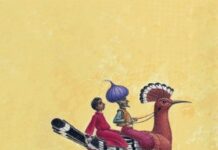
Ebook Info
- Published: 2011
- Number of pages: 321 pages
- Format: EPUB
- File Size: 1.95 MB
- Authors: Salman Rushdie
Description
The novel that set the stage for his modern classic, The Satanic Verses, Shame is Salman Rushdie’s phantasmagoric epic of an unnamed country that is “not quite Pakistan.” In this dazzling tale of an ongoing duel between the families of two men–one a celebrated wager of war, the other a debauched lover of pleasure–Rushdie brilliantly portrays a world caught between honor and humiliation–“shamelessness, shame: the roots of violence.” Shame is an astonishing story that grows more timely by the day.
User’s Reviews
Reviews from Amazon users which were colected at the time this book was published on the website:
⭐“Shame” by Salman Rushdie is a story that is fabricated based on an imaginary country – a dream that eventually crumbles. Rushdie uses the elaborate intricacies among characters and fuse these fantasies together with the Pakistani reality. It is essentially a historical escapade being narrated both allusively and fictitiously. The plot centers around the personal enmities and bad blood between the two family clans: Harappa and Hyder. This actually is an indirect insinuation to the partitioning of the Indian subcontinent and the situation in Pakistan that was characterized by turbulence and intranquility in its modern history. According to Rushdie, irrational religion and political violence are the driving forces in society where the culture of shame and shamelessness is originated. Through this novel, we see how the process of a modern country is being established and how it eventually self-destructs. “Shame” possesses a complicated and yet aureate style of writing, the blend of magical realism, mythology, religion, oral literature, and other elements. It is established in the Indian subcontinent where there is a unshakable, ingrained cultural background. Because of the fact that Rushdie is both deeply and equally implicated in Indian and English literature, it allows him to create this bold, imaginary world and still preserves his courage and responsibility to accept all the ramifications.The setting of “Shame” is quite exotic and distant. Undoubtedly, the depiction of utopianism is in existence and full of madness in the novel, and Rushdie has indirectly placed some irony and sarcasm towards civilization itself. He is accused of misrepresenting Pakistani history, and basically vilifying the Islamic faith. In the beginning, he narrates a very odd story in which the three sisters in the town of Q have established an agreement that they will sleep in one room and endure the same consequences and shame. Even when one of them is pregnant, the other two simultaneously show signs of pregnancy. Their son Omar Shakil is the outcome of their actions. Here, we see the structural background of allegory: the three people are sisters and yet are dissimilar creating a fat Omar Shakil – the structure of the Holy Trinity is very close who the Rushdie is – being nourished by India, Pakistan, and England.In the real world, the word shame leads the reader to connect to the word disgrace in which people feel embarrassed. Rushdie’s “Shame” wants to unearth the origin of such concept. According to him, there are two kinds of violence that create shame and shamelessness: psychological impact of religion and the every day political violence. Rushdie endows “shame” as a resisting power, a hidden power, to disintegrate the fictional country that is supported by religion and political violence. It is cyclical that a country that is built based on shame will be crumbled too because of it. However, the reality is more cruel because even if a utopia is eradicated, there will be another one established because violence follows the principle of shame.
⭐It’s a complex and intricate novel but uneven at times. Many shimmering moments and lines, but it’s easy to get disoriented and lost. Quite graphic too so def not for young ones. For fans of his other works, it is probably right in the ballpark of what they have come to expect, a mystical and daliesque world, full of shape shifting and jumps back and forth in time and space. For first time readers of him, I would not recommend.
⭐I was required to get this book for my postcolonial literature class. Many of the characters serve as an allegory to Pakistani politicians. Rushdie’s writing style is unlike any other’s I have read. His sentences can run up to fourteen lines long. This book is also an example of metafiction; Rushdie will often interrupt the story to remind readers this book is fictional and the leaders fake. He calls attention to what is happening in the real world, saying changes don’t come quite so easily as they do in a book, and he offers an intriguing glimpse into how and why he invented the characters. I like Rushdie, and intend to read more of his works.
⭐I like quirky but I had a very hard time following this story line. Gave up.
⭐This is more of a long political essay. But, since it is Rushdie, and, since it is fiction (almost), it has his normal touch of the magical and the exaggerated.I haven’t disliked this many characters in one book since Richardson’s “Clarissa”! I am very glad I never had the opportunity to meet any of them.Overall, I wasn’t as moved as I usually am by one of his books. The whole book was a downer, but well worth the read for the history lesson.
⭐Incredibly written, each sentence evokes a different thought. Taken one way, brought back again another, a story weaved as intricately as one of Rani’s shawls.
⭐Extremely well written as expected but the story was a bit below his best shot.
⭐The prose is inventive if disorienting. If you enjoy a meandering narrative of disposable characters that switches back and forth in time and place like a stream of consciousness from a stoned and drunken auntie; this is the book for you. I did not finish it past 40%; a distinction only a handful of books have earned from me.
⭐This is the second time I’ve tried reading this book, and I finally managed to get through it.A story that is part semi-historical and part fantasy, it tells the story of Pakistan through two families as they come together, fall apart, come back together, in a realistic chain of political and romantic events. At times difficult to read, but overall it absorbed me completely.My only quibble is with this kindle edition and some errors that the proof-readers missed. The use of 1 (Ones) instead of the capital I. The last three chapters bore more spelling errors of names and other words (weire instead of we’re, which is implied by the context). It’s nothing that can’t be figured out which I done, but breaks the immersion in the story for a moment.Despite this, I have to give this book a 5 star rating. I don’t do this often, but books rarely impress me as much as this, and possibly not since Yuya Sato’s Dendera. I would definitely recommend this book.
⭐I wish I hadn’t waited so long to read a Salman Rushdie novel. I’m now torn between rereading Shame at least three more times or starting into Rushdie’s other works. The first chapter of Shame blew me away. The colour is beyond description. The chapters after that, simply took my breath away as I hadn’t realised an author could take such liberties. When I’d become accustomed to the breath-taking story telling, I discovered I was now engrossed in the lives of the characters. That the characters included a country, cultures and a history, as well as people, helped me finally understand why Rushdie is just so important an artist.I couldn’t wait. I’ve ordered ‘Midnight’s Children’ and ‘The Satanic Verses.’
⭐This book is a well researched and brilliantly written novel which would be of interest to anyone linked to Pakistan. Rushdie has a very playful narrative style which provides some comic relief as well as keeping the story from becoming monotonous.The novel itself is about the reasons for Pakistan’s struggles; still coming to terms with post colonialism, the effects of partition, conflict of the islamic religion, hostilities between west and east Pakistan, westernised elites leading the country. All these themes are encapsulated by the extremes of shame and shamefulness.I have heard from some reviews that the book can be enjoyed without understanding the history of Pakistan. This may well be true but I do feel that you will get the most out of this book if you have an interest in the history and politics of Pakistan.
⭐Another gem from Rushdie. The story of Omar is a ‘magic realism’ take on the identity crisis of Pakistan. The first modern theocratic state which, when conceived, was intended to be secular. What does it mean to be Pakistani? The country, arbitrarily formed by the British drawing lines on a map, suffers from conflicting cultures, language and religion. A fascinating analogy of country and individual.
⭐I re-read Rushdie’s novel now against the background of his ‘Joseph Anton’, and it is surprising how farsighted this book appears today. Many details seem to be foreshadowing, although, of course, they are not.Apart from this, I love – as I did some 25 years ago – the colouring (or should I say seasoning?), the constant surprises (though I should not be surprised, really), the ‘oriental’ story-telling with its western breaks.Three mothers to one child? – no problem!Ali Baba’s cave as a gigantic brothel for the in-laws of one family? – what an idea!This book is sheer delight.Thomas Brueckner
Keywords
Free Download Shame: A Novel in EPUB format
Shame: A Novel EPUB Free Download
Download Shame: A Novel 2011 EPUB Free
Shame: A Novel 2011 EPUB Free Download
Download Shame: A Novel EPUB
Free Download Ebook Shame: A Novel





